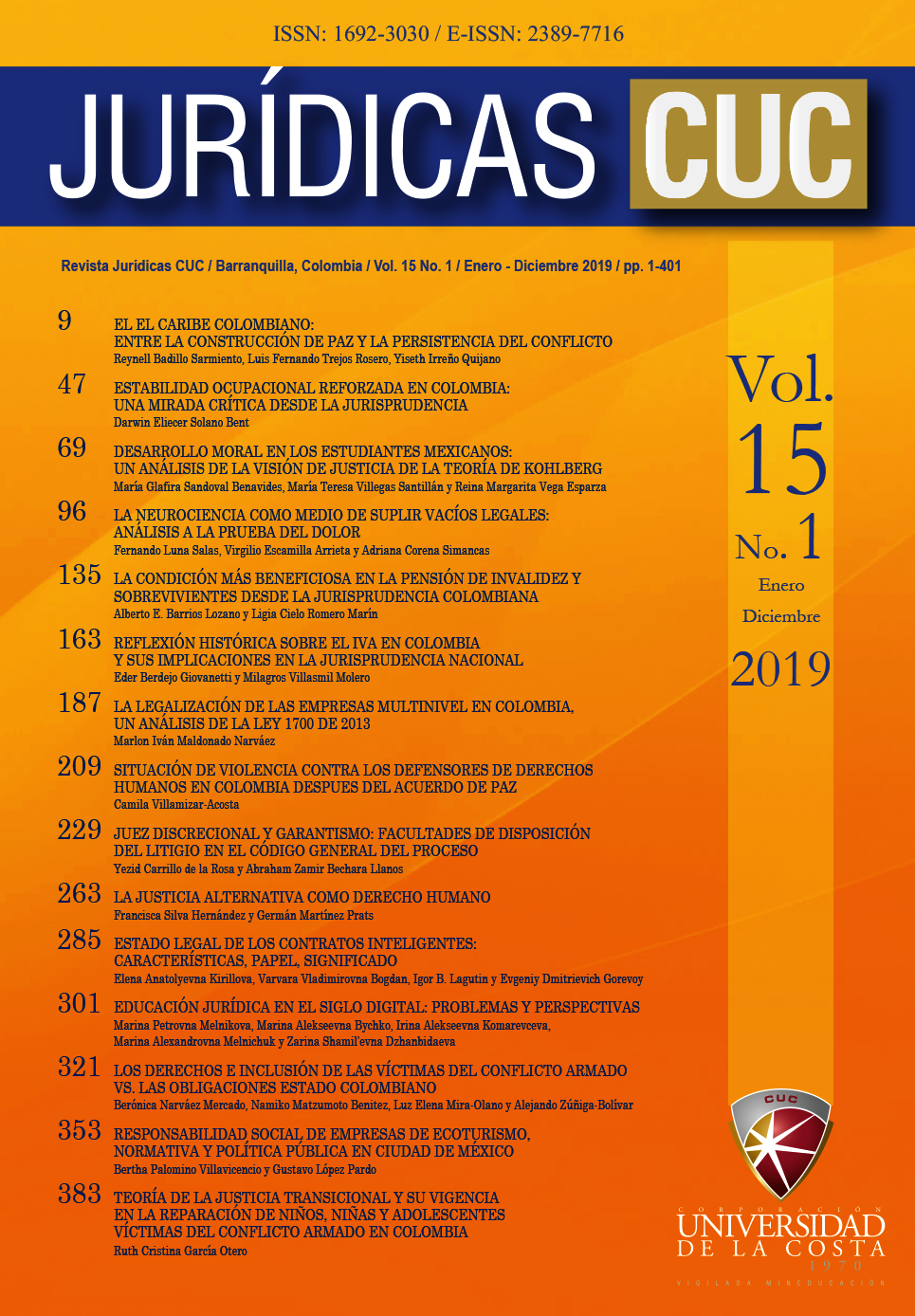Moral development in Mexican students: Analysis of the Kohlberg´s theory vision of justice
DOI:
https://doi.org/10.17981/juridcuc.15.1.2019.03Keywords:
students, moral development, justice, Kohlberg theoryAbstract
Education implies profound changes that generate endless processes of construction of the subject. Currently, education resorts to training for productivity and competitiveness, through memoristic, mechanical and utilitarian knowledge. The task of the 21st century for citizens is to assume their civic responsibility. The objective of the research was to determine the moral development of a group of Mexican students according to Kohlberg's theory and methodology. From focused interviews, results were obtained at pre-conventional levels, where respect for the law prevails, regardless of the common good, up to conventional levels, in which laws, justice and general welfare are respected. In order to improve this moral and justice vision, precursor of the common good, educational strategies for students are proposed.
Downloads
References
Barra, E. (1987). El desarrollo moral: una introducción a la teoría de Kohlber. Revista Latinoamericana de Psicología, 19(1). 7-18. Recuperado de http://www.redalyc.org/html/805/80519101/
Bell, D. (2006). Las contradicciones culturales del capitalismo. Madrid: Alianza.
Bobbio, N. (2009). El futuro de la Democracia. Estudios Políticos, 46(1). 62-73. Recuperado de http://dx.doi.org/10.22201/fcpys.24484903e.1985.1.60131
Cortina, A. (1995). La educación del hombre y del ciudadano. Revista Iberoamericana de Educación, 7(1), 41-63. Recuperado de https://rieoei.org/RIE/article/view/1199
Cortina, A. (2003). Conferencia: Ética, ciudadanía y modernidad. Revista Cyber Humanitas, 27(1). 1-13. Recuperado de https://web.uchile.cl/vignette/cyberhumanitatis/CDA/vida_sub_simple3/0,1250,PRID%253D7562%2526SCID%253D7566%2526ISID%253D347,00.html
Craig G. y Baucum D. (2009). Desarrollo psicológico. (9 ed.). México, D.F.: Pearson.
Díaz-Serrano, J. (2015). El desarrollo del juicio moral en Kohlberg como factor condicionante del rendimiento académico en ciencias sociales de un grupo de estudiantes de educación secundaria. Revista Electrónica EDUCARE, 19(3), 1-14. Recuperado de https://dialnet.unirioja.es/servlet/articulo?codigo=5169749
Hersh R., Reimer J. y Paolitto D. (2002). El crecimiento moral: de Piaget a Kohlberg. Madrid: Narcea Ediciones.
Kant, I. (2003). Crítica de la Razón práctica. Buenos Aires: La Página. Recuperado de http://www.manuelosses.cl/VU/kant%20Immanuel_Critica%20de%20la%20razon%20practica.pdf
Kant, I. (1788/1961). Crítica de la Razón Práctica. Buenos Aires: Losada.
Kohlberg L. (2008). Psicología del desarrollo moral. (2 ed.). Bilbao: Desclée.
Kohlberg, L., Power, F. y Higgins A. (2009). La educación moral según Lawrence Kohlberg. Barcelona: Gedisa.
Linde, A. (2009). La educación moral según Lawrence Kohlberg: Una Utopía realizable. Praxis Filosófica, 28(1). 7-22. Recuperado de https://www.redalyc.org/html/2090/209014646001/
Mac Pherson, C. B. (2005). La democracia liberal y su época. Madrid: Alianza. Recuperado de https://perio.unlp.edu.ar/catedras/system/files/macpherson.pdf
Mifsud, T. (1983). Los seis estadios del juicio moral con aplicación pedagógica. [Documento de Trabajo 3.428 del Centro de Investigación y Desarrollo de la Educación - CIDE]. Santiago de Chile: Universidad Católica de Chile. Recuperado de http://repositorio.uahurtado.cl/bitstream/handle/11242/8692/3428.pdf
Palomo, A. (1989). Laurence Kohlberg: Teoría y práctica del desarrollo moral en la escuela. Revista interuniversitaria de formación del profesorado, 4(1). 79-90. Recuperado de https://dialnet.unirioja.es/servlet/articulo?codigo=117615
Platón. (1981). Diálogos Socráticos. (16ta ed.) México, D.F.: Cumbre.
Sánchez A. (2000). Formación de valores: Teoría, reflexión y respuesta. México, D.F.: Editorial Grijalbo.
Uribe, C. (2006). Un Sexenio de Oportunidad Educativa México 2007-2012. Banco Interamericano de Desarrollo. Departamento Regional de Operaciones II. [Nota política]. Recuperado de http://investigadores.cide.edu/aparicio/BID_NotaPolitica_Educacion_06.pdf
Valcárcel, A. (1988). Hegel y la ética: sobre la superación de la “mera moral”. Barcelona: Anthropos.
Zerpa, C. (2007). Tres teorías del desarrollo del juicio moral: Kohlberg, Rest, Lind. Implicaciones para la formación moral. Laurus, 13(3). 137-157. Recuperado de https://www.redalyc.org/html/761/76102308/
Published
How to Cite
Issue
Section
License
Copyright (c) 2019 JURIDICAS CUC

This work is licensed under a Creative Commons Attribution-NonCommercial-NoDerivatives 4.0 International License.
The authors are exclusively responsible for the published articles, which do not necessarily reflect the views of the editorial committee.
JURIDICAS CUC respects the moral rights of authors who have assigned the property rights on the published materials to the editorial committee. In turn, the authors declare that the work they submit has not been previously published.


 English
English
 Español (España)
Español (España)



